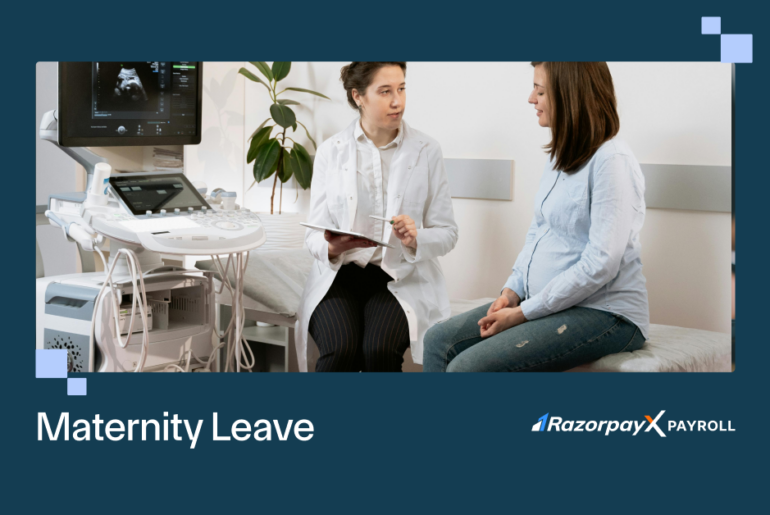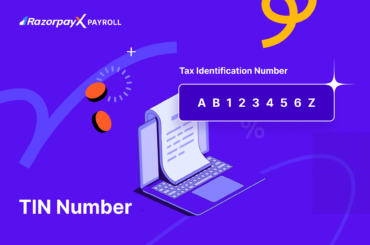Table of Contents
What is Maternity Leave?
Maternity leave is a long-term paid leave offered by businesses to support pregnant women employees before and after child birth. Maternity leave allows new mothers to focus on their wellbeing and bond with their newborn without the stress of having to return to work immediately.
Maternity leave is required by law under the Maternity Benefit Act of 1961. Employers that fail to comply with maternity leave related laws may face fines and imprisonment. This blog explains all the laws and compliances that employers need to follow to support pregnant employees.
Automate employee leave management, payroll and more with RazorpayX Payroll.
Maternity Leave Policy in India
Here are the requirements under the Maternity Benefit Act of 1961:
- All pregnant female employees are eligible for paid leave of 26 weeks for their first and second birth of which 8 weeks of leave can be availed before delivery.
- For third and following births, female employees are eligible for maternity leave of 8 weeks in total.
- No pregnant woman can be made to do any work which is labour-intensive or requires long hours of standing, which can be harmful to the normal development of the foetus.
- The maternity leave period should be a paid leave, meaning the employer will continue to pay the employee her daily wages during her period of leave.
- A mother who adopts a child under the age of three months is entitled to a leave of twelve weeks, or three months from date of handover of the child
- In case of illness, premature birth or any other pregnancy-related complication, female employees are eligible to an extra 1 month of paid leave.
- Every woman eligible for maternity benefits is also eligible to receive a medical bonus of Rs 1000, unless the employer is able to provide free pre-and post-natal care.
Eligibility for Maternity Benefits
Female employees need to fulfil the following criteria to be eligible for maternity benefits:
- The employee must have worked in the organisation for at least 160 days in the year before delivery.
- All female employees in private companies, government organisations, factories, mines, plantations with more than 10 employees are eligible.
- The Maternity Benefit Act does not apply to self-employed women.
Importance of Maternity Leave for Employees
The participation of women in the workplace is vital to the growth and prosperity of the economy as a whole. Maternity leave is one of the many regulations that have made it possible for women to flourish in their careers while balancing the demands of motherhood.
Workplaces with more support for pregnant women and mothers enjoy higher employee retention, more diversity which in turn fosters innovation, collaboration and growth.
The Maternity Benefit Act also ensures that new mothers can continue to grow in their career without being hindered by the time away from work. It requires that women returning from maternity leave are reinstated to their original positions with the same responsibilities and conditions.
Maternity Benefits Documents Needed
Expecting mothers and employers will need to keep the following rules in mind:
- The pregnant employee will need to submit a medical certificate confirming the pregnancy. This certificate will have to be issued by a registered medical practitioner.
- In case of any illness or complication, a similar medical certificate should be provided for any extra leaves required.
Maternity Leave Challenges for Employers
Maternity leave is a long-term paid leave, and so comes with its own set of challenges to tackle.
Workforce planning
When an employee goes on leave for 6 months or more, it creates a gap in the normal workflow. HR managers will have to account for this gap and take proactive steps to fill the gap before the employee goes on maternity leave. This gap can be filled by either hiring a temporary replacement or training existing employees to temporarily take up extra work.
Supportive work environment
It is the duty of HR managers to ensure that pregnant employees are well-supported during and after maternity leave. This can be done by regularly checking on her well-being, ensuring proper accommodations are made when she returns to work – remote work options, flexible working hours.
Financial impact
For smaller businesses, there may also be financial implications of maternity leave which are important to account for. Paying a non-working employee for six months can put a lot of pressure on a small, growing business, and requires good financial planning.
Retention and reintegration
When the employee returns to the workforce, it is important for the employer to ensure the transition is smooth and easy. It can be challenging to ensure the employee does not feel left behind or unable to catch up, but the challenge can be tackled with training, support and frequent catch-ups.
Manage employee leaves and automate payroll with RazorpayX Payroll
Manually managing employees and payroll is a tedious, expensive task. With RazorpayX Payroll, automate the process end-to-end.
- Industry-first employee self serve portal where employees can request for leaves, apply for reimbursements etc
- Integrations with partners like Slack, Whatsapp, Zoho People, etc, making RazorpayX Payroll the only software you’ll need
- The only tool in India which automates compliance calculations and payroll
FAQs
How many days maternity leave do I get?
Women delivering their first or second child get 24 weeks or 6 months of paid maternity leave. Women delivering their third or subsequent children get 8 weeks of maternity leave.
What other benefits do pregnant employees get?
Pregnant female employees get 24 weeks of maternity leave, Rs 1000 as medical bonus or free post- and pre-natal care, extra paid leave in case of complications.
Who is eligible for maternity benefit?
As long as a woman has been working in a business for at least 160 days in the year before her pregnancy, she is eligible for maternity leave.





